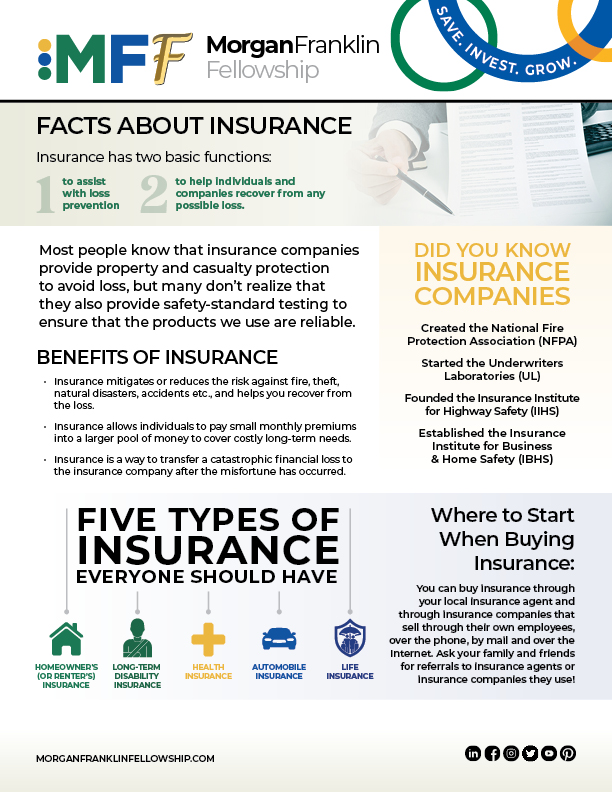Facts About Insurance
A risk is something that exposes us to danger, harm, or loss. We face risks every day, and often these risks can have a financial impact on our lives. Getting sick, breaking a leg, having a car accident, or experiencing a house fire are examples of risks that may happen to any of us. If we had to pay the full costs for doctor’s visits, surgeries, and automobile repairs ourselves, it could cause a substantial financial burden in our lives.
To protect against the financial consequences associated with these risks, consumers often choose or are required to purchase insurance policies. Insurance policies reduce a person’s financial risk in areas such as:
- health – medical insurance
- eyesight – vision insurance
- automobiles – auto insurance
- property – homeowner’s or renter’s insurance
- death – life insurance
Consumers pay a fee for these policies, called a premium, which is typically much less than the costs associated with this risk without insurance. The consumer who buys the insurance policy is called a policyholder. The policyholder might pay the premium all at once or through a payment plan that divides the total cost into payments that are made monthly, quarterly, or some other agreed payment schedule.
Key Insurance Terms to Learn
- Insurance: The practice or arrangement in which a company or government agency provides a guarantee of compensation for specified loss, damage, illness, or death in return for payment of a premium.
- Insured: The person, group, or organization whose life or property is covered by an insurance policy.
- Insurer: A person or company offering insurance policies in return for premiums; person or organization that insures.
- Policy: In the insurance context, it is a written contract between the insured and the insurer.
- Policyholder: The individual or firm that acquires and wants protection from the risk and generally in whose name an insurance policy is written. The holder is not necessarily the insured. For instance, life insurance policies might be bought by employers of key employees, or a husband might buy and be the holder of a life insurance policy on his wife. In such cases, the buyer is the policyholder.
- Premium: The amount of money that has to be paid for an insurance policy.
- Risk: Exposure to danger, harm, or loss.
Helpful Money-Savings Tips About Insurance Policies:
- When purchasing insurance, consider working with an independent insurance agent or broker as they represent multiple insurance companies with more products than working directly with an insurance company.
- Consider “bundling” your insurance policies with one insurance carrier to maximize any discounts (and remember to ask about specific insurance discounts such as “safe driver” insurance, homeowner improvements or enhancements such as a security system, etc.).
- Evaluate your policy(ies) with your agent when you have life changes (marriage, divorce, children, job change, etc.) as well as annually to ensure you have sufficient coverage.
Did you know that Benjamin Franklin was called the Father of American Insurance?
In 1730, Philadelphia would experience a devastating fire in the Fishbourn’s wharf, destroying all the stores and several homes in the area. A local by the name of Benjamin Franklin believed the tragic event could’ve been greatly contained with the most basic of firefighting instruments. This spurred him to create Philadelphia’s first volunteer firefighting department, the Union Fire Company. ~Andrew Hernandez
![]()
A Journey to Personal Financial Success
At Morgan Franklin Fellowship (MFF), we support the concept of financial freedom – by teaching participants how to save by paying themselves first, invest for their future and grow their net worth.
Learning how money works and how to talk about money with others are the first steps towards recognizing an individual’s lifelong financial goals. Our online programs, podcasts, blogs, and book reviews and resources are designed to help you learn the concepts, rules and vocabulary of money, finance and investing.
Becoming an MFF Fellow
Our Standards of Financial Literacy – Learning about money series is engaging, full of interesting information, and easy to navigate. Adapted from the National Standards for Personal Financial Education developed by the Council for Economic Education (CEE), this robust curriculum features six short lessons on such important topics as earning income, understanding the value of saving and using credit. When completed, this program lays the foundation for becoming an MFF Fellow.
Becoming an MFF Fellow is the ticket to access additional MFF programs and opportunities for mentoring, networking, internships and real-world opportunities. Hear from the MFF Fellow themselves on how these opportunities encourage them to continue their journey to personal financial success.
Learn More about Money
Begin the journey towards personal financial independence today. START LEARNING TODAY
